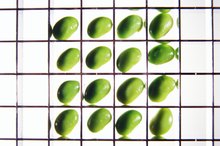Wheat Germ & Estrogen
Wheat germ is the embryo or the reproductive part of the wheat seed and it is considered the most nutrient-rich part. Wheat germ contains compounds called phytoestrogens, which can mimic the effects of the hormone estrogen by binding to estrogen sites in your body. Phytoestrogens are thought by some researchers to disrupt hormone balance in men and promote estrogen dependent cancers in women. However, in recent studies, fermented wheat germ extract seems to display anti-cancer activity in both estrogen dependent and non-dependent cancers 3. Consult with your oncologist about the appropriateness of consuming wheat germ products if you have cancer.
Wheat Germ
Refined grain products use the main carbohydrate part of the grain, while removing the germ and bran of the seed. Whole grain products retain the germ and sometimes the bran, which accounts for their richness in vitamins, minerals and fiber.
Phytoestrogens
Soy and Hormonal Imbalance
Learn More
Phytoestrogens, sometimes called plant estrogens, can mimic the properties of estrogen once they get inside your body because they fit with estrogen receptors on cells. Wheat germ is not a rich source of phytoestrogens, but that depends on how much of it you consume.
Fermented Wheat Germ
Fermenting grains and legumes changes their biochemical properties, and fermented wheat germ extract seems to inhibit a variety of cancers. According to Memorial Sloan-Kettering Cancer Center, fermented wheat germ extract made in Hungary and called Avemar has been extensively studied and has proved to inhibit both estrogen dependent and non-dependent breast tumors in humans and mice in vitro, which means in the lab outside the body 3. Avemar inhibited tumor growth by an average of 50 percent, which was more effective than chemotherapy drugs such as tamoxifen. When Avemar was combined with chemotherapy drugs, the cancer growth rates were inhibited by almost 60 percent. Researchers postulate that wheat germ is biochemically altered during fermentation and develops a mechanism to interfere with the use of glucose by cancer cells, which is their primary fuel, and disrupts DNA synthesis and proliferation.
- Fermenting grains and legumes changes their biochemical properties, and fermented wheat germ extract seems to inhibit a variety of cancers.
- According to Memorial Sloan-Kettering Cancer Center, fermented wheat germ extract made in Hungary and called Avemar has been extensively studied and has proved to inhibit both estrogen dependent and non-dependent breast tumors in humans and mice in vitro, which means in the lab outside the body 3.
Phytoandrogens
Foods That Act Like Estrogen
Learn More
According to the book “Nutritional Sciences” by Michelle McGuire, the age of the grain has an effect on phytoestrogen content versus phytoandrogens, which are able to mimic male oriented hormones such as testosterone 4. Phytoandrogens reach maximum concentrations in plants during pollination and then drop rapidly thereafter. As such, young, green wheat germ might be more “male oriented” because it contains these compounds as well as high levels of phytosteroids and nutritional cofactors that support the synthesis of male hormones.
Related Articles
References
- “American Dietetic Association Complete Food and Nutrition Guide: 3rd Edition”; Roberta Larson Duyff; 2006
- “American Cancer Society Complete Guide to Nutrition for Cancer Survivors”; Barbara L. Grant et al; 2010
- Memorial Sloan-Kettering Cancer Center: Wheat Germ Extract
- “Nutritional Sciences”; Michelle McGuire; 2007
- Schagen SK, Zampeli VA, Makrantonaki E, Zouboulis CC. Discovering the link between nutrition and skin aging. Dermatoendocrinol. 2012;4(3):298-307. doi:10.4161/derm.22876
- National Institutes of Health. Vitamin E: Fact Sheet for Health Professionals. Updated February 28, 2020.
- Keen MA, Hassan I. Vitamin E in dermatology. Indian Dermatol Online J. 2016;7(4):311-5. doi:10.4103/2229-5178.185494
- Food Allergy Research & Education. Wheat Allergy.
- Berkeley Wellness. University of California. Should Anyone Take Vitamin E?. Published January 24, 2014.
Writer Bio
Sirah Dubois is currently a PhD student in food science after having completed her master's degree in nutrition at the University of Alberta. She has worked in private practice as a dietitian in Edmonton, Canada and her nutrition-related articles have appeared in The Edmonton Journal newspaper.









